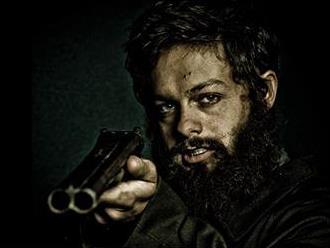Image: www.queenslandtheatre.com.au
No other figure has haunted the Australian imagination as much as the bushranger legend, Ned Kelly. Misunderstood misfit, loyal to his mates and the ultimate rebel, Ned Kelly is now an entrenched icon of our nation’s culture. It comes as no surprise then that such a pervasive figure of our country’s history has come to haunt the mind of playwright Matthew Ryan, giving birth to the tense, one act thriller, Kelly.
Produced by the Queensland Theatre Company and being subjected to an extensive national tour, the heavily lauded play has struck a chord with audiences intrigued about the final hours of Ned’s life. Locked in a jail cell, facing execution, Ned’s fame had already spread far and wide, attracting the admiration of colonial Australia in his pursuit for justice against the oppressive police. When he receives a surprise visitor at his eleventh hour, the following exchange becomes a soul-searching expose of sibling rivalry and the quest for redemption.
Disguised as a priest to avoid detection by authorities after he was believed to have perished in the bank fire, Dan Kelly offers his brother a chance to avoid the harsh execution of the rope in favour of a more sedate method of demise. However, the oft-overlooked sibling’s offer comes with a condition and its this attempt at blackmail that drives the tension filled drama between the two brothers for the next hour as they relive their lives in the Kelly household and the last moments of the Kelly gang.
Emotions rage in the bleak and shadowy surroundings of the sparsely decorated set, placing the dim spotlight firmly on the battle taking place between the two brothers. The arrogant and self-assured Ned, played by Steven Rooke, saunters rings around the diminutive and desperate Dan, Leon Cain. Challenging Dan’s motivations for the visit, Ned encapsulates his opponent in brutal mind games to demonstrate his superiority not only as a Kelly but as a hero to the nation. So effective is Ned’s contortion of his weak-willed brother, that ultimately the tables are turned on Dan, leaving him once again in the position of constantly seeking acceptance.
While Kelly is not necessarily ground breaking theatre, it is an allegory to the innate curiosity we have for the place of Ned Kelly in Australian history. The fast-paced dialogue weaves in events and places visited by the Kelly gang on their chase to Glenrowan demonstrating the fascination that continues to bind us to the Kelly legend. It is this overwhelming desire to illustrate what happened or might have happened that is among Kelly’s triumphs. Historical fiction is a contentious art and those brave few who venture in its depths are likely to face categorical criticism. The no holds barred script treads the line in this respect with insinuations of relationships between the Kellys that have more to do with empathy for the characters than historical accuracy. The accusations raised by the brothers detracts somewhat from the credibility of the play leading the mind of the audience to wander from the theatre to their own recollections of Ned Kelly to try to piece together what actually happened. Ultimately, Kelly is a tribute to the incessant whim of imagination and history’s role in ensuring that today’s creative forces are kept alive.
While the momentum of the production takes a while to gather, with Cain in particular needing some time to appear comfortable in his role, the questioning process that the play arouses in the audience starts long before the actors have stepped on the stage. The sometimes contrived lines and assumption of prior knowledge also make it difficult to settle into the flow of the play, which weaves back and forth in re-enactments of previous events. However, the inevitable impact of Kelly will be a resurgence of interest in the bushranger and whether rumours circulating of Dan’s escape can in fact be corroborated. It is these unanswered questions that make the study of history such an essential addition to forging our national culture and its use as an artistic vehicle is a welcome addition to the theatre scene.
Theatre, like all forms of artistic expression, plays an important role in the national debate. Kelly is no exception to its contribution in this regard. The bleak, stark styling of the characters brings to life personas we have only pondered about in history books or Peter Carey novels. By humanising these icons, Ryan has given us a glimpse of what matters most not only in creating a compelling tale but also to our national identity. We gravitate to Ned Kelly on stage as the archetypal underdog, pursued by a corrupt system that seeks to undermine his devotion to his family. Similarly, Dan Kelly is portrayed as the contemptuous traitor, a coward to his bitter end. These dichotomies have become ingrained in our psyche as by-products of tales told to us from an early age, tales that prioritise bravery, loyalty and resilience in the face of defeat. Subconsciously we gravitate to heroes such as Ned Kelly for the role they have played in forging the ideals we hold for our own identity. In seeking to capitalise upon the rebellious icon, Kelly reflects our need to cling to historic heroes as part of our relentless inquisition about the past.
Rating: 3 out of 5 stars
Kelly
By Matthew Ryan
Directed by Todd MacDonald
Designer: Simone Romaniuk
Cast: Steven Rooke, Kevin Spink, Anthony Standish
Lighting Designer: Ben Hughes
Composer/Sound Designer: Guy Webster
Fight Director: Niki-J Price





